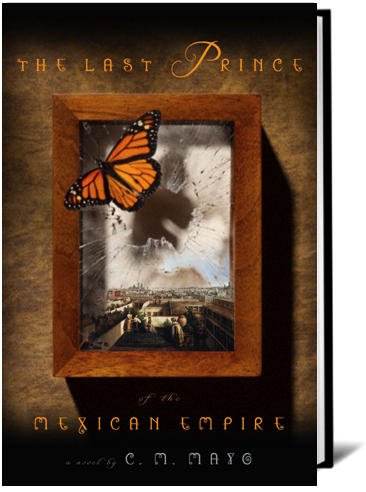|
The Last Prince of the Mexican Empire A novel based on the true story |
|
|
 HOME + C.M. MAYO + REVIEWS + EXCERPTS + Q & A + LISTEN + RESEARCH + EVENTS + ORDER +
HOME + C.M. MAYO + REVIEWS + EXCERPTS + Q & A + LISTEN + RESEARCH + EVENTS + ORDER + From the first chapter; the setting for
this scene is Washington DC in the late 1850s. (Angelo de Iturbide
was the secretary for the Mexican Legation.)  MISS ALICE
GREEN would not be budged:
Mr Iturbide was the beau for her. He was so handsome, sensitive
as a poet, well-read, he had been to New York, London, Paris,
Italy, La Havana, and Texas, too. And his handwriting, so frank,
so elegant, however did he learn such penmanship? MISS ALICE
GREEN would not be budged:
Mr Iturbide was the beau for her. He was so handsome, sensitive
as a poet, well-read, he had been to New York, London, Paris,
Italy, La Havana, and Texas, too. And his handwriting, so frank,
so elegant, however did he learn such penmanship?"The priests always said, ask yourself, ‘Can the Pope read it?'" That sent her into peals of laughter. By spring-time, several times a week, Mr Iturbide came all the way up the hill to Rosedale to call on her. With a wary Mrs Green chaperoning, they went to hear the Marine Band play, and one time, they took a buggy out to see Great Falls. Angel (properly pronounced Ahn-hel), was his Christian name, but his family and friends called him Angelo, which was Italian. Angelo stirred his coffee with a stick of cinnamon, wasn't that fascinating? Angelo drank Madeira wine, he smoked Cuban cigars, he had a piping of silver on his ruffled shirt-sleeve cuffs. Such panache! And he was very brave. They were picnicking at Mount Vernon, tossing leftover breadcrumbs to the gulls, when Alice made the little question that had been tugging at the corner of her mind. Not so long ago, her country and his had been at war. As she had been too young to be reading newspapers at that time, she had not understood, nor cared since to learn the whys and wherefores of it. (Her older sister had caught a glimpse of the war's hero, General Winfield Scott, at a White House levée; she had thought him "very wrinkly.") Now, anyone who had eyes to see colored pictures knew that Santa Anna, the "Napoleon of the West," he had the smarter uniform, not that boring old navy-blue. Santa Anna may have lost the war, but the Mexicans' leader did not just have epaulettes and a couple of rows of brass buttons, he had a crimson coat with a breastplate of the most arabesque gold embroidery! Alice tossed her last handful of breadcrumbs at the gulls. "Why," she finally asked, "did you not go fight in the Mexican conflict?" "Santa Anna was my father's enemy." "So?" "If I'd shown myself in Mexico, he would have gone straight for me." The meaning of that washed like a great wave into Alice's mind; as it receded, she was left with a sparklingly new appreciation of her beau. Alice nodded sagely. "You stayed here to avoid assassination." Angelo was lying on his side, propped on one elbow. He looked at her strangely, then gave her a wry smile. "I suppose one could see it that way." For a time they were silent. Mrs Green was napping in the buggy, which was parked in the cooling shade of an oak tree. There were others picnicking on this same lawn, but none close enough to overhear. A flock of geese was feeding near water's edge. The breeze pulled at the strings of Alice's bonnet. And then Angelo told her how it had been for him, that he had been heart-sick with grief and shame, not so much that his country had been invaded, but that the Mexican army had been so incompetent in its defense. "They were a gang of barbarians. Santa Anna is a creature out of a cess-pit." "And General Almonte?" Alice asked, because she remembered, hadn't the ambassador been at the Alamo with Santa Anna? "Oh." Angelo twisted his mouth. "He's alright." His family had been granted generous pensions by the Mexican government, he went on, but during the war years, and for some time afterwards, they were not paid. It was bitterly hard for his mother. To save his pennies, he himself had had to go live in the country. For news of the war, every day that the Senate was in session, Angelo would cross the bridge over Rock Creek and walk the several miles up the gravel of Pennsylvania Avenue to the Hill, to sit in the gallery. When Mr Thomas Corwin of Ohio spoke, one wanted to be sure to hear every word! Angelo did not say where he was going, but his landlady had suspected he was up to something. "Your shoes are wearing out," she'd said. "And you've got the appetite of a hippopotamus." Alice laughed. She plucked a grape. Angelo went on, "I would receive messages in Spanish that said, Watch your back. Be careful. I did not know what it meant, or who was sending them." "You were in mortal danger!" "Maybe..." He was watching a schooner glide by. Ducks bobbed in its wake. "I only wanted to know what was going on, but I could not show any concern about the war, because then people would think I knew something." "Now that Santa Anna may go into exile, will you return to your country?" His gaze met hers. He looked all of a sudden very pale. He came up from his elbow and he reached over and took her hand. "Miss Green— " he began. "Yes," she interrupted. "I will go with you." |
|
|
 |